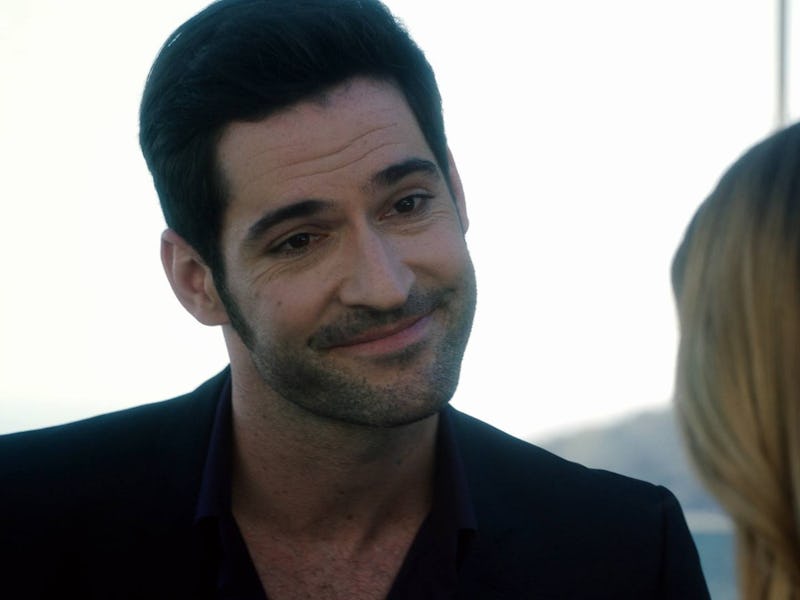Fox's 'Lucifer' Misuses Neil Gaiman's Story and the Result Is Hogwash
Fox's new show is a masterclass in how to make the fantastical boring

We covered the early look at Fox’s supernatural cop procedural Lucifer back in August when the show’s pilot was leaked, and again in October when Fox released a trailer. Inverse, like the rest of the internet, hasn’t been able to pin down why Lucifer doesn’t feel appealing, though many of us consider ourselves comic book fans. The answer might lie in Neil Gaiman’s particular brand of storytelling.
Gaiman’s not a serious guy. Keep in mind, he’s happily married to known-cheeseball Amanda Palmer.
Ohohoho, see what he did there? Anyone with a pulse can see what he did there.
Lucifer may be inspired by comic books, but in order to understand the show’s tone, viewers will have to keep in mind that Neil Gaiman’s comics are not the snappy, candy-colored Marvel issues which now feel so mainstream. Gaiman’s values as a storyteller are more sentimental than gritty, and if Fox’s Lucifer follows the Morningstar character as well as it purports to, the resulting show will appeal to fans of Once Upon a Time and The Shannara Chronicles. These fans are adults who want the same simple magic they once experienced watching Disney’s fairytales; that is, worlds where bad guys are bad because they have black slick hair and are barely mean to other characters. Lucifer isn’t going to do anything that embodies evil as we know it. He’s just “bad” because we’re supposed to think he is. The humor here is sly, not cutting, and Lucifer Morningstar is “cool” the way Gandalf is “cool,” which is … almost.
Fans of contemporary fiction that uses mythological beings and fairytales will enjoy the morality explored in Lucifer, not because it delves deep into any particular human’s psyche, but because it exists in a universe where things aren’t complicated. Lucifer is a non-human creature from the afterlife in The Sandman, and like the other characters he speaks with, including Dream — the comics’ protagonist — he demonstrates only a lukewarm interest in human affairs. Therefore, audience members looking for pure escapism will tune in to watch him solve crimes and avoid that guy with the wings from the show’s trailer.
It seems Lucifer in the television show will have the same detached way of viewing human beings as the character did in the comics. Although humans do feel compelled to tell him their whole, ugly truths, Lucifer doesn’t seem like he wants to, or has the ability to, make humans do anything in particular. Gaiman’s comic book character maligns the human habit of blaming wrongdoing on some concept of “the devil,” so Fox’s Lucifer will probably make this argument ad nauseam. Even in the show’s trailer, he counsels a young woman who apparently did a lot of drugs and took “naked selfies,” telling her that she’s responsible for her own actions, and they end up hugging.
So if Lucifer doesn’t actually have any agency in the human world, why produce the show? Again, Gaiman’s comics are about tweaking human morality slightly, not to make any important assertions about good or evil, but to simply ask hypothetical questions. The trailer asks, “what if the devil decided to quit and move to the City of Angels?” Gaiman’s Sandman comics ask, “What if humans dream because a mythological being allows them to, and what if humans tried to capture him?” Each mythological scenario can play out in the human world, though they both really comment on Gaiman’s invented universes. In this way, Gaiman writes high fantasy that only disguises itself as fusion: Lucifer may be the devil, the show’s trailers assure us, but he’s among humans now, helping the police solve murders and experiencing sexual chemistry with a woman who somehow negates his powers.
High fantasy does have a “cool factor” problem — its genre-cousins science fiction and superhero fiction have been rebooted and revitalized — but shoehorning Gaiman’s fanciful, dreamy world into a dark Los Angeles isn’t the way to get mainstream audiences interested. In fact, the same formula — put a fantastical character (in this case a zombie) in with cops and scientists — is working well for iZombie, but that show benefits from smart dialogue and a respect for the zombie-horror genre. If Lucifer is going to be a part of the fantasy renaissance, it ought to commit to the ridiculousness of its premise, as the confusingly-still-popular Once Upon a Time, Grimm and Supernatural series have. Striving for realism with a goofy character like Lucifer Morningstar won’t win over mainstream America, it will just alienate those of us who just want to see Lucifer talk in an other-dimension void with the physical embodiment of dreams.